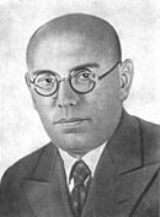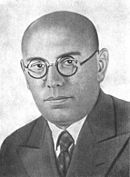
Itzik Feffer
Encyclopedia

Yiddish language
Yiddish is a High German language of Ashkenazi Jewish origin, spoken throughout the world. It developed as a fusion of German dialects with Hebrew, Aramaic, Slavic languages and traces of Romance languages...
איציק פֿעפֿער, Russian
Russian language
Russian is a Slavic language used primarily in Russia, Belarus, Uzbekistan, Kazakhstan, Tajikistan and Kyrgyzstan. It is an unofficial but widely spoken language in Ukraine, Moldova, Latvia, Turkmenistan and Estonia and, to a lesser extent, the other countries that were once constituent republics...
Ицик Фефер, Исаàк Соломòнович Фèфер) was a Soviet
Soviet Union
The Soviet Union , officially the Union of Soviet Socialist Republics , was a constitutionally socialist state that existed in Eurasia between 1922 and 1991....
Yiddish poet who fell victim to Joseph Stalin
Joseph Stalin
Joseph Vissarionovich Stalin was the Premier of the Soviet Union from 6 May 1941 to 5 March 1953. He was among the Bolshevik revolutionaries who brought about the October Revolution and had held the position of first General Secretary of the Communist Party of the Soviet Union's Central Committee...
's purges
Great Purge
The Great Purge was a series of campaigns of political repression and persecution in the Soviet Union orchestrated by Joseph Stalin from 1936 to 1938...
.
Background
Itzik Feffer was born in ShpolaShpola
Shpola is a city located in the Cherkasy Oblast in central Ukraine. It is the administrative center of the Shpoliansky Raion , and is situated at . As of 2004 the estimated population is 18,400.-History:...
, a town in Zvenigorod
Zvenigorod
Zvenigorod is an old town in Moscow Oblast, Russia. Population: -History:The community has existed since the 12th century, although its first written mention is dated 1338. The town's name is based either on a personal name or on a hydronym Zvenigorod is an old town in Moscow Oblast, Russia....
uyezd
Uyezd
Uyezd or uezd was an administrative subdivision of Rus', Muscovy, Russian Empire, and the early Russian SFSR which was in use from the 13th century. Uyezds for most of the history in Russia were a secondary-level of administrative division...
(district) of Kiev
Kiev
Kiev or Kyiv is the capital and the largest city of Ukraine, located in the north central part of the country on the Dnieper River. The population as of the 2001 census was 2,611,300. However, higher numbers have been cited in the press....
guberniya
Guberniya
A guberniya was a major administrative subdivision of the Russian Empire usually translated as government, governorate, or province. Such administrative division was preserved for sometime upon the collapse of the empire in 1917. A guberniya was ruled by a governor , a word borrowed from Latin ,...
, Imperial Russia.
World War II
During the Second World WarWorld War II
World War II, or the Second World War , was a global conflict lasting from 1939 to 1945, involving most of the world's nations—including all of the great powers—eventually forming two opposing military alliances: the Allies and the Axis...
he was a military reporter with the rank of colonel
Colonel
Colonel , abbreviated Col or COL, is a military rank of a senior commissioned officer. It or a corresponding rank exists in most armies and in many air forces; the naval equivalent rank is generally "Captain". It is also used in some police forces and other paramilitary rank structures...
and was vice chairman of the Soviet Jewish Anti-Fascist Committee (JAC)
Jewish Anti-Fascist Committee
The Jewish Anti-Fascist Committee was formed on Joseph Stalin's order in Kuibyshev in April 1942 with the official support of the Soviet authorities...
. He and Solomon Mikhoels
Solomon Mikhoels
Solomon Mikhoels ; was a Soviet Jewish actor and the artistic director of the Moscow State Jewish Theater. Mikhoels served as the chairman of the Jewish Anti-Fascist Committee during the Second World War...
traveled to the United States in 1943 in a well-documented fund-raising trip.
Arrest and death
In 1948, after the assassination of the JAC Chairman Solomon MikhoelsSolomon Mikhoels
Solomon Mikhoels ; was a Soviet Jewish actor and the artistic director of the Moscow State Jewish Theater. Mikhoels served as the chairman of the Jewish Anti-Fascist Committee during the Second World War...
, Feffer, along with other JAC members, was arrested and accused of treason. Feffer had been an informer for the NKVD
NKVD
The People's Commissariat for Internal Affairs was the public and secret police organization of the Soviet Union that directly executed the rule of power of the Soviets, including political repression, during the era of Joseph Stalin....
(predecessor of the KGB
KGB
The KGB was the commonly used acronym for the . It was the national security agency of the Soviet Union from 1954 until 1991, and was the premier internal security, intelligence, and secret police organization during that time.The State Security Agency of the Republic of Belarus currently uses the...
) since 1943. Feffer reportedly cooperated with the investigation, providing false information that would lead to the arrest and indictment of over a hundred people, but at the trial made openly nationalistic statements and expressed pride in his Jewish identity. Feffer had also allegedly been one of the "most loyal and conformist Yiddish poets," helped to enforce strict ideological control over other Yiddish writers, and had a history of denouncing colleagues for their "nationalistic hysteria".. However, in 1952 Feffer, along with other defendants, was tried at a closed JAC trial, and executed on August 12, 1952.
Feffer was rehabilitated posthumously in 1955 after Stalin's death.
Paul Robeson
The American concert singer and actor Paul RobesonPaul Robeson
Paul Leroy Robeson was an American concert singer , recording artist, actor, athlete, scholar who was an advocate for the Civil Rights Movement in the first half of the twentieth century...
met Feffer on July 8, 1943 in New York during a Jewish Anti-Fascist Committee
Jewish Anti-Fascist Committee
The Jewish Anti-Fascist Committee was formed on Joseph Stalin's order in Kuibyshev in April 1942 with the official support of the Soviet authorities...
event chaired by Albert Einstein
Albert Einstein
Albert Einstein was a German-born theoretical physicist who developed the theory of general relativity, effecting a revolution in physics. For this achievement, Einstein is often regarded as the father of modern physics and one of the most prolific intellects in human history...
, one of the largest pro-Soviet rallies ever held in the United States. After the rally, Paul Robeson and his wife Eslanda Robeson, befriended Feffer and Mikhoels.
Six years later, in June 1949, during the 150th anniversary celebration of the birth of Alexander Pushkin, Robeson visited the Soviet Union to sing in concert. According to David Horowitz
David Horowitz
David Joel Horowitz is an American conservative writer and policy advocate. Horowitz was raised by parents who were both members of the American Communist Party. Between 1956 and 1975, Horowitz was an outspoken adherent of the New Left before rejecting Marxism completely...
,
"In America, the question 'What happened to Itzhak Feffer?'entered the currency of political debate. There was talk in intellectual circles that Jews were being killed in a new Soviet purge and that Feffer was one of them. It was to quell such rumors that Robeson asked to see his old friend, but he was told by Soviet officials that he would have to wait. Eventually, he was informed that the poet was vacationing in the CrimeaCrimeaCrimea , or the Autonomous Republic of Crimea , is a sub-national unit, an autonomous republic, of Ukraine. It is located on the northern coast of the Black Sea, occupying a peninsula of the same name...
and would see him as soon as he returned. The reality was that Feffer had already been in prison for three years, and his Soviet captors did not want to bring him to Robeson immediately because he had become emaciated for lack of food. While Robeson waited in Moscow, Stalin's police brought Feffer out of prison, put him the care of doctors, and began fattening him up for the interview. When he looked sufficiently healthy, he was brought to Moscow. The two men met in a room that was under secret surveillance. Feffer knew he could not speak freely. When Robeson asked how he was, he drew his finger nervously across his throat and motioned with his eyes and lips to his American comrade. They're goin to kill us, he said. When you return to America you must speak out and save us."
During his concert in Tchaikovsky Hall on June 14 - which was broadcast across the entire country - Robeson publicly paid tribute to Feffer and the late Mikhoels, singing the Vilna Partisan
Fareinigte Partizaner Organizacje
The Fareynikte Partizaner Organizatsye was a Jewish resistance organization based in the Vilna Ghetto that organized armed resistance against the Nazis during World War II...
song "Zog Nit Keynmol
Zog Nit Keynmol
Zog Nit Keyn Mol is the name of a Yiddish song written in 1943 by Hirsh Glick, a young Jewish inmate of the Vilna Ghetto...
" in both Russian and Yiddish.panartist.com Recordings of the concert survived but Robeson's spoken words are lost.
Literary work
Feffer was a prolific poet, who wrote almost exclusively in Yiddish, and his poems were widely translated into Russian and Ukrainian. He is considered one of the greatest Soviet poets in the Yiddish language and his poems were widely admired inside and outside Russia.Di Shotns fun Varshever Geto
His epic poem Di Shotns fun Varshever Geto ("The Shadows of the Warsaw Ghetto" is a tribute to the 750 Jews who rebelled against the Nazi liquidation of the ghetto and gave their lives fighting tyranny during World War II.Books of poetry
- Shpener, 1922
- Vegn zikh un azoyne vi ikh (About Me and Others Like Me), 1924
- A shteyn tsu a shteyn (A Stone to a Stone), 1925
- Proste reyd (Simple Words), 1925
- Bliendike mistn (Blossoming Garbage), 1926, a paradoxical title about the revival of a shtetlShtetlA shtetl was typically a small town with a large Jewish population in Central and Eastern Europe until The Holocaust. Shtetls were mainly found in the areas which constituted the 19th century Pale of Settlement in the Russian Empire, the Congress Kingdom of Poland, Galicia and Romania...
in Soviet times - Gefunene funken (Found Sparkles), 1928
- Gevetn (Competition), 1930
- Plakatn af bronze (Posters in Bronze), 1932
- Kraft (Force), 1937
- Afsnay (Anew), 1948
Further reading
- Rappaport, Louis. Stalin's War Against the Jews: The Doctors Plot & The Soviet Solution (Free Press: 1990) ISBN 0-02-925821-9
- Stewart, Jeffrey C. (editor). Paul Robeson: Artist and Citizen. Hardcover (Rutgers Univ Pr, April 1, 1998) ISBN 0-8135-2510-1, Paperback (Rutgers Univ Pr, April 1, 1998) ISBN 0-8135-2511-X
- Duberman, Martin. Paul Robeson: A Biography. 804 pages. New Press; Reissue edition (May 1, 1995). ISBN 1-56584-288-X.
External links
- http://www.joshuarubenstein.com/rubenstein/stalinsecret/intro.html [Broken]
- http://www.friends-partners.org/partners/beyond-the-pale/eng_captions/61-3.html Group photo of the members of the Jewish Anti-Fascist Committee.
- http://www.midstreamthf.com/200207/feature.html
- http://www.rachelkorn.com/text/articleyiddishculture.htm http://lib.ru/PROZA/LEWASHOW/mihoels.txt A novel in Russian detailing Mihoels and Feffer's trip to the U.S. and other countries during World War II and Mihoels' subsequent murder.

